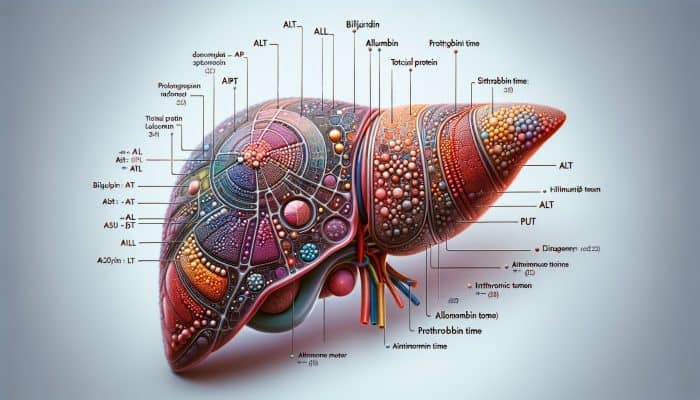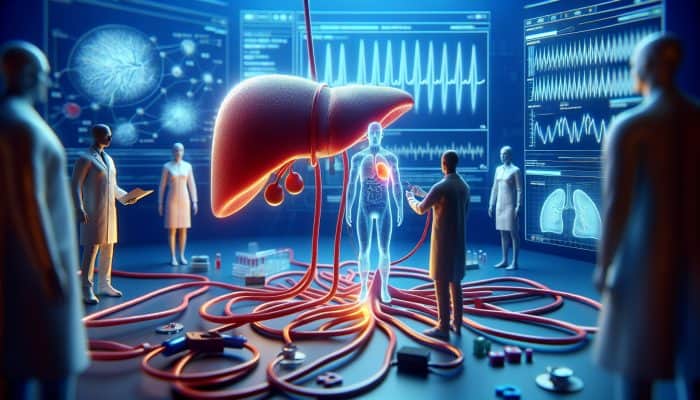Ultimate Resource for Advanced Liver Blood Tests: Ensuring Your Health and Well-being
Unlocking the Significance of Advanced Liver Blood Tests for Optimal Health

Advanced Liver Blood Tests in Maidstone are essential diagnostic evaluations meticulously crafted to thoroughly assess the functionality and overall health of your liver. These specialised tests provide invaluable insights for healthcare professionals about various liver conditions, enabling early detection of potential health problems before they develop into severe complications. The primary components typically evaluated during these tests include:
- Alanine Aminotransferase (ALT)
- Aspartate Aminotransferase (AST)
- Alkaline Phosphatase (ALP)
- Bilirubin levels
- Albumin and total protein measurements
- Prothrombin time
- Liver enzyme levels
- Autoimmune markers
By meticulously analysing these crucial components, healthcare providers can obtain a comprehensive understanding of liver functionality, detect any abnormalities, and take necessary actions swiftly. This proactive approach to health management is vital for effectively overseeing patient health and ensuring long-term well-being.
The Imperative of Regular Liver Health Monitoring for All Individuals
In the contemporary, fast-paced world, the need for consistent monitoring of liver health has never been more critical, especially with the increasing prevalence of liver diseases. Conditions such as fatty liver disease, hepatitis, and cirrhosis often remain asymptomatic until they reach advanced stages. This reality underscores the importance of routine advanced liver blood tests for early detection. Regular testing not only facilitates better treatment outcomes but also enhances overall health. Early identification of liver issues allows healthcare providers to recommend essential lifestyle modifications or medical interventions that can significantly decelerate the progression of liver diseases and improve the quality of life for patients.
For those with a family history of liver disease or risk factors such as obesity, high alcohol consumption, or specific medication regimens, regular testing becomes even more crucial. This proactive health management strategy empowers patients to take control of their health, making informed decisions that positively impact their treatment options and long-term health outcomes.
Step-by-Step Guide to Accessing Advanced Liver Blood Testing Services in Maidstone
Residents of Maidstone can conveniently access advanced liver blood tests through a variety of healthcare providers located in the region. Numerous local hospitals and private clinics are well-equipped to deliver these essential diagnostic services, ensuring that individuals can readily obtain vital assessments of their liver health. Notable institutions such as Maidstone Hospital, alongside various private healthcare facilities, offer a comprehensive range of liver testing services. This accessibility empowers residents to prioritise their liver health without encountering significant barriers, paving the way for improved long-term health outcomes.
Moreover, many of these healthcare facilities employ cutting-edge technology and highly trained medical personnel, ensuring that patients receive accurate and timely results. Patients can obtain advanced liver blood tests either via referrals from their general practitioners or by arranging direct appointments, making the entire process straightforward and efficient.
Exploring the Multifaceted Benefits of Advanced Liver Blood Tests

The advantages of advanced liver blood tests extend far beyond mere diagnostics; they are crucial for the early detection of liver diseases, facilitating timely interventions that can significantly enhance patient outcomes. For example, the early identification of elevated liver enzymes can trigger immediate lifestyle alterations or medical treatments that may prevent severe liver damage or failure.
In addition, these tests play a pivotal role in the ongoing monitoring of patients with pre-existing liver conditions. They enable healthcare professionals to track changes in liver function over time, which is essential for adjusting treatment plans and ensuring patients receive the most effective and tailored care. Essentially, advanced liver blood tests serve as a foundational component in maintaining liver health and enhancing overall patient outcomes.
Expert Perspectives on Advanced Liver Blood Testing in Maidstone
Elevating Liver Health Monitoring Through Advanced Testing Techniques
Advanced liver blood tests significantly improve the monitoring of liver health by enabling the early detection of potential issues before symptoms manifest. For example, individuals in Maidstone who regularly participate in screenings can detect conditions such as non-alcoholic fatty liver disease at an early stage, allowing healthcare providers to recommend critical lifestyle changes, including dietary modifications and increased physical activity, which can substantially enhance liver health.
Real-life case studies highlight the positive outcomes associated with early detection. For instance, consider a 45-year-old male resident diagnosed with elevated ALT levels. After this diagnosis, he was advised to adopt healthier eating habits and reduce alcohol consumption. Follow-up testing showed significant improvements in liver function, underscoring the effectiveness of proactive health management strategies. Such cases exemplify the crucial role that advanced liver blood tests play in preventive healthcare.
What to Expect During Your Advanced Testing Procedure

Participating in an advanced liver blood test is generally a straightforward and minimally invasive procedure. A qualified healthcare professional will draw a small blood sample, typically from a vein in your arm. This quick process is usually painless and takes only a few minutes to complete. Once the blood sample is collected, it is sent to a laboratory for the analysis of various markers indicative of liver health.
Patients can expect to receive their results within a few days, allowing for prompt follow-up consultations with their healthcare provider. It is essential to voice any concerns or questions you may have during the testing process, as understanding the procedure can help alleviate any anxiety associated with testing. Overall, the experience is designed to be as comfortable and efficient as possible, ensuring that patients receive the necessary care without unnecessary stress.
Effectively Interpreting Your Liver Test Results to Enhance Health Management
Interpreting the results of your liver blood tests can be complex due to the numerous markers measured and their implications for your health. Each component, such as ALT and AST levels, provides specific insights into liver functionality; however, effective interpretation requires professional expertise since various factors can influence the outcomes.
Consulting with a healthcare professional is crucial in this context. They can dedicate time to explain the significance of your results, taking into account your medical history, lifestyle choices, and any symptoms you may be experiencing. This personalised approach ensures that your health management plan is tailored to your specific needs, ultimately enhancing the effectiveness of any recommended interventions.
How to Prepare Effectively for Your Advanced Liver Blood Test
Crucial Preparations to Undertake Before Your Testing Appointment
Proper preparation for an advanced liver blood test is vital for ensuring accurate results. Patients are often advised to fast for a specific period, typically around 8 to 12 hours before the test, which means refraining from all food and drink except for water. Additionally, informing your healthcare provider about any medications you are currently taking is equally important, as certain medications may need to be temporarily paused to prevent interference with the test results.
Adhering to the specific instructions provided by your healthcare provider is essential for obtaining reliable test results. This preparatory phase significantly enhances the accuracy of assessing your liver health. By taking these preparatory steps seriously, you can greatly contribute to the effectiveness of the testing process and the subsequent health strategies derived from the results.
Addressing Common Concerns of Patients Through Effective Communication
It is entirely normal for patients to have concerns regarding the testing process or potential outcomes. Common worries often include fears related to needles, anxiety about results, and questions surrounding health implications. Addressing these concerns involves maintaining open communication with your healthcare provider, who can offer reassurance and thorough explanations about what to expect during and after the test.
Understanding common side effects of blood tests, such as minor bruising or discomfort at the puncture site, can also help alleviate fears. Ultimately, being informed and prepared allows patients to approach the testing process with increased confidence and reduced anxiety, ensuring a smoother experience overall.
Where to Access Advanced Testing Services in Maidstone
Maidstone is home to several reputable locations for advanced liver blood testing, encompassing both hospitals and private clinics. Notable establishments like Maidstone Hospital offer comprehensive testing services, ensuring residents have access to high-quality care. Private clinics also provide flexible appointment options and often shorter wait times, catering to individuals seeking convenience.
When selecting a testing location, consider factors such as proximity, available services, and patient reviews. Many facilities in Maidstone are equipped with advanced technology and staffed by experienced professionals, ensuring accurate results and appropriate follow-up care. This variety of options empowers patients to choose the facility that best aligns with their needs.
Research-Backed Benefits of Advanced Liver Blood Testing in Maidstone
The Critical Importance of Early Detection of Liver Diseases
One of the most significant advantages of advanced liver blood tests is their potential for the early detection of liver diseases. Research indicates that identifying abnormalities in liver function can lead to timely interventions, improving outcomes for patients diagnosed with conditions such as hepatitis or fatty liver disease. For individuals who receive abnormal results, it is crucial to follow up promptly with a healthcare provider.
Taking actionable steps, such as scheduling follow-up tests, undergoing imaging studies if recommended, and making lifestyle changes based on healthcare advice, can significantly enhance recovery prospects and overall well-being. By actively engaging in their health management, patients can effectively navigate the complexities of liver health and maintain better control over their condition.
The Vital Role of Regular Monitoring of Liver Function Over Time
Consistent advanced liver blood testing is crucial for tracking changes in liver function, particularly for individuals diagnosed with chronic liver conditions. By monitoring variations in liver enzymes and other relevant markers over time, healthcare providers can assess the effectiveness of treatments and make necessary adjustments. This ongoing monitoring is essential for optimising patient care and ensuring any changes in health status are promptly addressed.
For patients, recognising the importance of these regular assessments fosters a proactive approach to health management. Engaging in discussions with healthcare providers about test results and their implications allows for better-informed decisions regarding lifestyle modifications and treatment strategies. Such proactive engagement serves as a cornerstone of effective chronic disease management and can lead to improved health outcomes.
How Advanced Liver Blood Tests Shape Treatment Plans
Advanced liver blood tests provide detailed information that can profoundly influence treatment plans for patients. These tests assist healthcare providers in identifying specific liver issues, allowing for tailored interventions. For instance, if test results indicate elevated bilirubin levels that suggest possible bile duct obstruction, a physician may recommend imaging studies or refer the patient to a specialist.
This personalised approach ensures that treatment is not only effective but also aligned with the individual patient’s health needs. By leveraging the detailed results from these tests to inform treatment strategies, healthcare professionals can optimise patient care and enhance outcomes, making advanced liver blood tests a critical element of comprehensive liver health management.
Understanding the Financial Aspects of Advanced Liver Blood Tests
Typical Costs Associated with Advanced Liver Blood Tests
The cost of advanced liver blood tests can vary significantly based on numerous factors, including the healthcare facility, the specific tests performed, and whether or not the patient has insurance coverage. On average, individuals might expect to pay between £100 and £300 for comprehensive liver testing. Understanding potential out-of-pocket expenses and what may be covered by insurance is crucial for effective financial planning.
Patients should consult with their healthcare providers about the specific tests being conducted, as certain comprehensive panels may carry different costs. Additionally, understanding the pricing structure will aid in financial planning related to healthcare, ensuring that there are no unexpected expenses when seeking these vital diagnostic services.
Understanding Insurance Coverage for Liver Blood Tests in Maidstone
Many insurance plans in Maidstone do cover advanced liver blood tests; however, coverage can vary depending on the specific policy and provider. Individuals are encouraged to check with their insurance provider to clarify coverage details, ensuring they are aware of any potential out-of-pocket costs. This proactive approach can help eliminate financial surprises and facilitate better planning when seeking medical care.
Some plans may require prior authorisation for certain tests, making it critical to understand the nuances of your insurance policy. By being informed about your coverage, you can navigate the healthcare system more effectively, ensuring you receive necessary tests without undue financial burden.
Finding Financial Assistance for Testing Costs
For individuals facing financial challenges in covering the costs of advanced liver blood tests, various financial assistance programs may be available. These resources can help alleviate the financial burden associated with healthcare. To access such assistance, consider the following steps:
- Contact local health organisations for information on financial aid programs.
- Inquire at your healthcare provider’s office about potential financial assistance options.
- Research non-profit organisations focused on liver health, which may offer support.
- Check with your local NHS Trust for information on funding for necessary tests.
By actively seeking these resources, patients can find support to navigate the costs associated with essential health services, ensuring that finances do not obstruct access to crucial care.
Essential Lifestyle and Dietary Recommendations for Optimal Liver Health
Dietary Adjustments to Promote and Enhance Liver Function
Maintaining a well-balanced diet is instrumental in supporting liver health. Incorporating a diverse range of fruits, vegetables, and whole grains provides essential nutrients that bolster liver function. Certain foods are particularly beneficial; for example, leafy greens can assist in detoxifying the liver, while fatty fish rich in omega-3 fatty acids can help reduce inflammation.
Furthermore, limiting saturated fats and sugars is crucial for preventing the accumulation of fat in the liver, thereby reducing the risk of fatty liver disease. Emphasising proper hydration is equally important, as adequate water intake supports the liver in its detoxification processes. By making these dietary modifications, individuals not only support liver function but also contribute to their overall health and well-being.
Essential Lifestyle Changes to Uphold and Support Liver Health
Conscious lifestyle choices can greatly influence liver health. One of the most significant adjustments individuals can make is to limit alcohol consumption, as excessive intake can lead to liver inflammation and damage. Maintaining a healthy weight is equally vital, given that obesity is a substantial risk factor for liver diseases, including non-alcoholic fatty liver disease.
Incorporating regular physical activity into your daily routine not only enhances liver function but also aids in reducing fat accumulation and improving metabolic health. Simple changes, such as walking more frequently or engaging in recreational sports, can yield substantial benefits for liver health. By adopting these lifestyle changes, individuals can take proactive steps towards enhancing their liver health and overall quality of life.
The Positive Impact of Regular Exercise on Liver Health
Regular physical activity is essential for maintaining liver health, as it promotes fat loss and enhances metabolic function. Engaging in exercise helps prevent conditions such as fatty liver disease, which is increasingly common in sedentary populations. Studies have demonstrated that even moderate exercise can lead to significant improvements in liver health by reducing liver fat and enhancing liver enzyme levels.
Additionally, exercise plays a vital role in regulating blood sugar levels, which is critical for optimal liver function. Activities like brisk walking, cycling, and swimming can be easily integrated into daily routines, promoting a healthier lifestyle overall. By prioritising regular exercise, individuals can significantly enhance their liver health and overall well-being.
The Crucial Importance of Hydration for Optimal Liver Function
Maintaining proper hydration is vital for optimal liver function. Water is essential for various bodily processes, including detoxification and nutrient transport. The liver relies on sufficient hydration to efficiently filter toxins from the blood and produce bile, which is necessary for fat digestion.
During hot weather or periods of increased physical activity, maintaining hydration levels becomes even more critical. Aim for a daily intake of approximately 2 litres of water, adjusting for personal needs and activity levels. By prioritising hydration, individuals can effectively support their liver’s essential functions while contributing to their overall health.
The Impact of Quality Sleep on Supporting Liver Health
Receiving adequate quality sleep is essential for maintaining liver health, as it supports the body’s natural repair and regeneration processes. Poor sleep quality can contribute to various health issues, including impaired liver function. Research has indicated that insufficient sleep can exacerbate liver inflammation and elevate the risk of liver disease.
Creating a conducive sleep environment and establishing a consistent sleep schedule can significantly improve sleep quality. Aim for 7-9 hours of restorative sleep each night, allowing the liver and other organs to rejuvenate and recover. By recognising the importance of sleep in relation to liver health, individuals can take proactive measures toward cultivating a healthier lifestyle.
Frequently Asked Questions About Advanced Liver Blood Tests
What constitutes an advanced liver blood test?
An advanced liver blood test is a comprehensive diagnostic tool that assesses liver function and health by measuring various enzymes and substances in the blood.
How often should I undergo liver blood tests?
The frequency of testing depends on individual risk factors; those with known liver conditions may require more frequent tests, while healthier individuals might consider annual assessments.
Are advanced liver blood tests painful?
The test involves a simple blood draw, which may cause minor discomfort; however, it is generally quick and well-tolerated by most patients.
What do elevated liver enzymes indicate?
Elevated liver enzymes can suggest liver inflammation, damage, or disease, prompting further investigation by a healthcare professional.
Can I eat before undergoing a liver blood test?
Patients are often advised to fast for 8-12 hours before the test, but specific instructions should be confirmed with your healthcare provider.
How long does it take to receive results from a liver blood test?
Results from advanced liver blood tests are usually available within a few days, facilitating prompt follow-up consultations.
What should I do if my liver test results are abnormal?
If test results are abnormal, consult with your healthcare provider to discuss next steps, which may include additional testing or lifestyle changes.
Are there any risks associated with liver blood tests?
The risks are minimal but may include minor bruising or discomfort at the blood draw site; serious complications are exceedingly rare.
Can lifestyle changes influence my liver test results?
Yes, lifestyle modifications such as diet, exercise, and alcohol consumption can significantly impact liver test results and overall liver health.
Where can I access advanced liver blood tests in Maidstone?
Advanced liver blood tests are accessible at local hospitals and private clinics in Maidstone, providing essential care for residents.
Connect with us on Facebook!
This Article Was First Found On https://bloodtest.co.uk
The Article Advanced Liver Blood Test: A Complete Guide for Maidstone Residents Was Found On https://limitsofstrategy.com
References:
https://limitsofstrategy.com/advanced-liver-blood-test-a-complete-guide-for-maidstone-residents-2/



